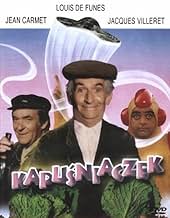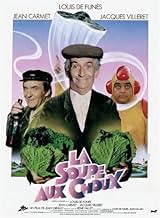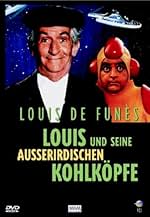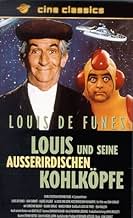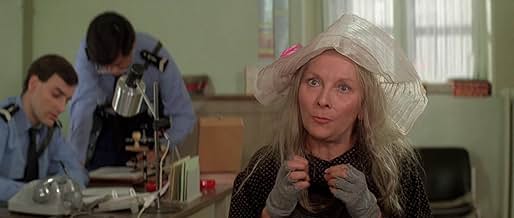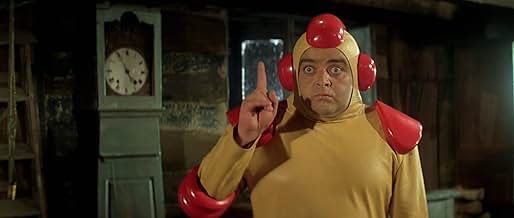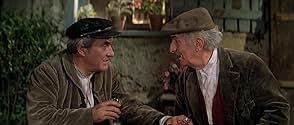La soupe aux choux
- 1981
- 1 h 42 min
AVALIAÇÃO DA IMDb
6,5/10
10 mil
SUA AVALIAÇÃO
Adicionar um enredo no seu idioma2 buddy farmers are visited by aliens who like their domestic cabbage soup.2 buddy farmers are visited by aliens who like their domestic cabbage soup.2 buddy farmers are visited by aliens who like their domestic cabbage soup.
- Direção
- Roteiristas
- Artistas
Jean-Pierre Rambal
- Commentator
- (narração)
Inge Offerman
- Mme Schoppenhauer
- (não creditado)
- Direção
- Roteiristas
- Elenco e equipe completos
- Produção, bilheteria e muito mais no IMDbPro
Avaliações em destaque
This was Mr de Funès on one of his last movies. Even if the health was not all there, he still had the touch and wacky ways of making us laugh. It had a moral, not to make fun at you elders, even if they are living in the past manners. You need to be open minded and you must be a fan of Mr de Funès to really appriciate his style of humour.
more than a film, a parable. more than a comedy, a reflection. about old age, about the fall of a world, about friendship, about importance of fairy tales who gives sense to life. it is seems absurd in many moments. but it has a special tool to become memorable- Louis De Funes. old, close to death, he does an unique mark to a character who reflects all the sins, virtues and absence of expectations of a rural France.he is not Cruchot or l'Avare but only a mall old man. and Jean Carmet is the perfect partner in a work far to be easy. so, The Cabbage Soup is a sort of legacy of a great actor. sad, almost cruel, using humor to describe the roots of contemporary France, it is a great film. for the memories. for the acting. for the special feeling who becomes useful after its end.
"La soupe aux choux" is more than all things, the story of the sincere friendship between two old men. Besides and in spite of rough discussions between them, this friendship remains complete and always sincere. It's necessary to precise that these old men are not farmers, but peasants, one was a well-sinker, the other a maker of sabots. It's also a mistake to believe that peasants are some resistant to change; this kind of mentality comes from old age, and it's true for everybody.
The beauty of that film comes before all from the greay quality of the actors and of their interpretation. And it's true not only for Louis de Funès, but also for Jean Carmet and Jacques Villeret. It's surely because of the quality of the direction of Jean Girauld, on the one hand and the dragging of the quality of play of that tremendous actor who was Louis de Funès on the other hand.
I have seen that film about fifty times at least, and I feel the need to see it again about three to four times a year. Each time I like it and never find it vulgar, because it's necessary to be highter than the apparent vulgarity of certain scenes. Never forget that everyone can, at a time in his life do some scenes like these, and we should not feel ashamed to do that, it's all and completely human. It's precisely what the film is, very human, and it explains the attachment we have for it. Even if the film is a little budget one, it's one of the best of that great actor who was Louis de Funès.
The beauty of that film comes before all from the greay quality of the actors and of their interpretation. And it's true not only for Louis de Funès, but also for Jean Carmet and Jacques Villeret. It's surely because of the quality of the direction of Jean Girauld, on the one hand and the dragging of the quality of play of that tremendous actor who was Louis de Funès on the other hand.
I have seen that film about fifty times at least, and I feel the need to see it again about three to four times a year. Each time I like it and never find it vulgar, because it's necessary to be highter than the apparent vulgarity of certain scenes. Never forget that everyone can, at a time in his life do some scenes like these, and we should not feel ashamed to do that, it's all and completely human. It's precisely what the film is, very human, and it explains the attachment we have for it. Even if the film is a little budget one, it's one of the best of that great actor who was Louis de Funès.
When I first saw it a few years ago, I have been deeply moved by this movie. Now I don't find it so striking, but when I reconsider it its humanity still remains. The clue is to love the characters, and then you would look sympathetically even to the stupid farting recital. The two old friends are in fact so kind at heart, striving to remain merry and hopeful, though are gradually deprived of every gift of life (youth, wife, wealth, other friends etc)! The merit of this movie is to speak in a simple way about big, sad issues. "Comedy is acting optimistic" (Robin Williams). On the plus side, one should add the great performance of the two leading actors, the jolly "accent du Midi", a too short cameo by Claude Gensac, and first of all the bitter-sweet, child-like and almost unreal solution to the loneliness of the two old men. On the minus side, a bit of a hurry sometimes, and especially the total lack of skill and motivation from the actress playing Claude's wife, ruining an important and rather unbelievable character.
The best De Funes film, quite different from the usual bulk.
The best De Funes film, quite different from the usual bulk.
There's a little magic in this film I'll have to add a little sentimental note here: This movie reminds me of good and bad childhood memories. The good being, that (like many Germans of my generation), I grew up with the Louis de Funes comedies so, yes, I was laughing very hard when I saw this film for the first time. The bad memories: a few days after having seen it first, I heard the de Funes had passed away and this may have been the only time in my life when I had tears rolling down my cheeks after hearing about the passing of an actor (this was before the time when everybody was racing to put a random, make-myself-feel-better "RIP" on Facebook, whenever a celebrity kicks the bucket).
In many ways, his second-to-last film was one of the most unusual de-Funes-Films. For one, the viewer can intrinsically tell, that De Funes was a very sick man; somebody who's at the end of his road, yet still summoning up his strength to give us the usual over-the-top, hyper-ventilating performance for which he was known and loved. Despite this being a "typical" de-Funes-Film, there are very strong, melancholic moments (especially those involving farmer Claude and his resurrected wife Franchine or the when Claude is reminiscing about past days), which was very rare for the typical de-Funes-film. What was also very atypical was the electro-sound-music that at times reminds of Jean-Michel Jarre. Some people have complained that the soundtrack wasn't fitting. Matter of personal taste really, but I dare you to look up the title-song on YouTube and not have the tune, be it the original or one of the many covers, stuck in the back of your head for a long time to come.
In essence, all slapstick and de Funes hyper-conundrum aside, it is a movie about people longing for simpler, "down to earth" (paradoxically) times, when you could still enjoy the starlit, countryside-sky with a friend, getting drunk on wine and Pastis (and, yes, not to mention the fart-tournaments between de Funes and Carmet, which goes beyond the contemporary "laugh because somebody farted"-joke). One of the films highlights is the scene where de Funes introduces his alien friend into the "art" of eating his homemade cabbage soup – watch it and tell me honestly to the face that it doesn't make you long for a bowl and a piece of bread, whether you like cabbage or not. Is this movie vulgar? Sure thing it is. Dishonest? Quiet the opposite. Makes one almost feel a little guilty writing this over the internet. Sure, those times aren't coming back, but that's what movies are for, no? One can honestly say: they don't make films like this anymore. I tend to ignore the last De-Funes-film ("Le gendarme et les gendarmettes"), thinking of "La Soup aux choux" as the final farewell from this master-comedian, as if to say: hey, no matter how tough things get, face them with a mischievous grin; what comes will come, but it will come more smoothly with a glass of Pastis and a bowl of home-made cabbage soup.
Mind you: this is by no means an objective review but I personally give it 9 out of 10.
In many ways, his second-to-last film was one of the most unusual de-Funes-Films. For one, the viewer can intrinsically tell, that De Funes was a very sick man; somebody who's at the end of his road, yet still summoning up his strength to give us the usual over-the-top, hyper-ventilating performance for which he was known and loved. Despite this being a "typical" de-Funes-Film, there are very strong, melancholic moments (especially those involving farmer Claude and his resurrected wife Franchine or the when Claude is reminiscing about past days), which was very rare for the typical de-Funes-film. What was also very atypical was the electro-sound-music that at times reminds of Jean-Michel Jarre. Some people have complained that the soundtrack wasn't fitting. Matter of personal taste really, but I dare you to look up the title-song on YouTube and not have the tune, be it the original or one of the many covers, stuck in the back of your head for a long time to come.
In essence, all slapstick and de Funes hyper-conundrum aside, it is a movie about people longing for simpler, "down to earth" (paradoxically) times, when you could still enjoy the starlit, countryside-sky with a friend, getting drunk on wine and Pastis (and, yes, not to mention the fart-tournaments between de Funes and Carmet, which goes beyond the contemporary "laugh because somebody farted"-joke). One of the films highlights is the scene where de Funes introduces his alien friend into the "art" of eating his homemade cabbage soup – watch it and tell me honestly to the face that it doesn't make you long for a bowl and a piece of bread, whether you like cabbage or not. Is this movie vulgar? Sure thing it is. Dishonest? Quiet the opposite. Makes one almost feel a little guilty writing this over the internet. Sure, those times aren't coming back, but that's what movies are for, no? One can honestly say: they don't make films like this anymore. I tend to ignore the last De-Funes-film ("Le gendarme et les gendarmettes"), thinking of "La Soup aux choux" as the final farewell from this master-comedian, as if to say: hey, no matter how tough things get, face them with a mischievous grin; what comes will come, but it will come more smoothly with a glass of Pastis and a bowl of home-made cabbage soup.
Mind you: this is by no means an objective review but I personally give it 9 out of 10.
Você sabia?
- CuriosidadesAt the time when the movie was made, De Funes was reluctant to keep acting as he found he was now too old to do so. He agreed to do this movie because he realized how much he had in common with his character.
- Erros de gravaçãoWhen Le Glaude retrieves the lock of hair from the grandfather clock, the clock-face door swings open. In the next shot we can see the door over his shoulder and it's closed.
- Versões alternativasThe German version was edited to reduce running time. 8 minutes were cut from the VHS tape, with another 2 minutes removed from the DVD.
- ConexõesFeatured in Louis de Funès ou Le pouvoir de faire rire (2003)
Principais escolhas
Faça login para avaliar e ver a lista de recomendações personalizadas
- How long is The Cabbage Soup?Fornecido pela Alexa
Detalhes
- Tempo de duração1 hora 42 minutos
- Mixagem de som
- Proporção
- 2.35 : 1
Contribua para esta página
Sugerir uma alteração ou adicionar conteúdo ausente

Principal brecha
By what name was La soupe aux choux (1981) officially released in India in English?
Responda
![Assistir a Bande-annonce [OV]](https://m.media-amazon.com/images/M/MV5BYzZmNjY3N2EtMzVkNy00ZWUxLWJjYjgtM2Y0NjQyNWFiMWE5XkEyXkFqcGdeQXRyYW5zY29kZS13b3JrZmxvdw@@._V1_QL75_UX500_CR0)
